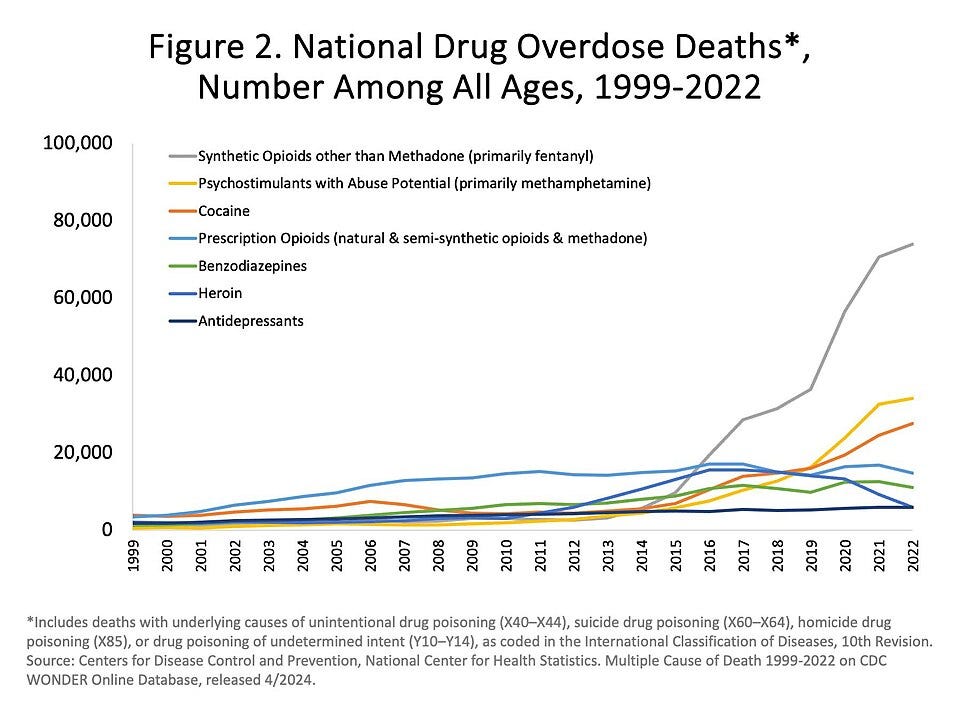Reading (or mostly listening to) books is one of my drugs/addictions/escapisms. I just finished listening to Demon Copperhead, a fictional story by Barbara Kingsolver describing destruction of lives caused by the opioid epidemic in the Lee County, a poor rural county in Kentucky. In her book Kingsolver provides a description of county’s “Opioid-economy” — the highly-paid and respected, not by a few, drug-rep pushing these “miracle” pain-relievers; the doctor providing the prescriptions to addicts for their pain. And, these prescriptions are very generous, providing an extra amount to sell. These pill-sales can provide a significant portion of the addicts’, albeit meager, household incomes. Higher up on the chain, some doctors, Big Pharma sales-reps, pharmacies, and very especially Big Pharma executives, made very good respectable incomes from this racket.
While I have read articles about opioid epidemic and the lawsuits against Big Pharma, I was pretty oblivious to this epidemic and always believed it was somewhere else, in a different world, if not a different Universe. But that’s not true:
Opioid addiction has affected at least one of my relatives1; and
I now realize that it has impacted a deceased neighbor here in Brown County, a relatively more affluent, though rural, county where I reside in Indiana2.
Figure 1. Death’s due to Opioids. For a decade and a half, the legal prescription opioids dominated the “market”. Most people that take opioids don’t die3 of overdoses. The number of people’s lives that have been ruined, or damaged by these legal opioids must be at least an order of magnitude (X 10) higher.
Thoughts:
Think of all the people imprisoned for distributing/pushing/dealing illegal opioids (e.g., heroin, cocaine, crack, and now fentanyl) as well as relatively harmless illegal drugs such as marijuana, and compare that to the number of people, if any, imprisoned for the nation-wide marketing/distribution/selling of legal prescription opioids. To be cynical, Law-Enforcement has been used to go after the competition.
People in my county must have known of this racket — but I don’t think any doctors, pharmaceutical reps, or pharmacists were ever arrested — because it was(?)/is(?), all perfectly “legal”. If anyone was arrested, it was probably those at the bottom of the chain, the addicted victims of this racket.
I have a relative that became addicted to opioids. He lived in a different state and we didn’t have much contact. I was unaware of his problem until the shit-hit-the-fan; once, and then again. The relapse rate for opioids can be as high as 80 - 90% in the first year. He’s had relapses, but lately they are minor and infrequent. After 5 years, the relapse rate falls to about 15%. An addict is always, unfortunately, at risk.
I recall a conversation I had perhaps 5 - 10 years ago. A neighbor told me that he needed to borrow money from me; later he told me that he didn’t need to borrow because the doctor had given him a prescription for his pain meds. That statement bounced off of me at the time as a complete non-sequitur, but now I think I know what he meant, i.e., he would be rich, for awhile anyway, with currency good in the local “opioid economy”.
Do a search on William Stewart Halsted — a morphine and cocaine addict who, as a “brilliant” and renowned surgeon, developed the modern medical surgeon residency program at John Hopkins (a “functional” addict). This system, people suggest, was probably designed to enable his addictions. I’m sure opioid addiction negatively impacts the life of most, if not all, opioid addicts, and the “functional addicts” lives and potential have been diminished if not severely damaged. And such it probably is with all addictions.


https://www.zerohedge.com/medical/fda-mandates-major-labeling-changes-opioid-pain-medication
Herman Goring was reportedly addicted to morphine. He made some stupid decisions. He apparently became addicted because of injuries suffered in ww1. Whether he would have made the same decisions without his addiction problem is someone that historians will debate for a long time.